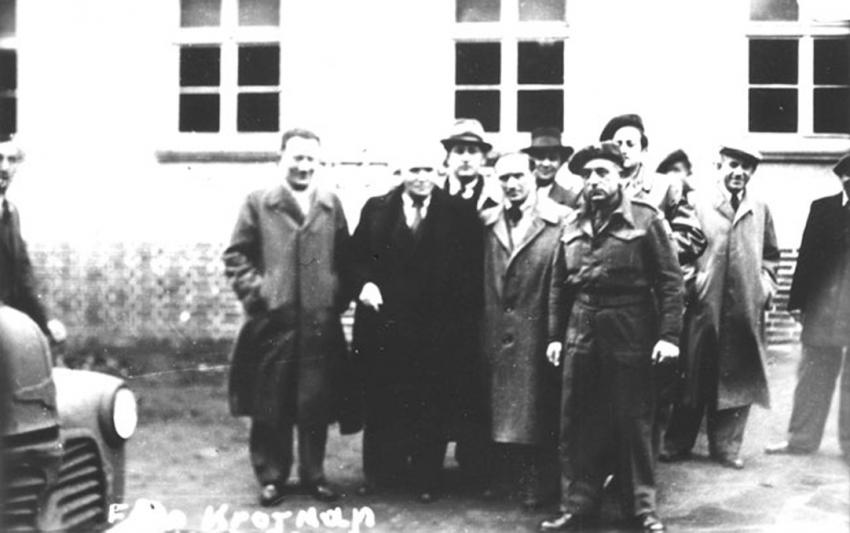Bergen-Belsen was opened in April 1943 as a detention camp for foreign citizens intended for exchange with the Allies, from which thousands of Jews were deported to be murdered. In March 1944 the camp became a concentration camp, and until its liberation on April 15, 1945, hundreds of thousands of prisoners had been transferred to the camp, the majority of whom arrived on death marches from Eastern Europe. Approximately 35,000 inmates died in the camp before liberation, from diseases, starvation and the harsh weather. After liberation, about half of the 60,000 liberated inmates perished.
A displaced persons’ camp was established in Bergen-Belsen, in which the liberated inmates carried on widespread cultural, political and social activities.
The visit of David Ben-Gurion, chairman of the Jewish Agency for Eretz Israel, in the DP camp in Bergen-Belsen was part of his visit to the concentration and DP camps in the vicinity of Frankfurt, Stuttgart, Munich, Heidelberg and Hanover, including Dachau and Bergen-Belsen. In the reports on his visit he wrote:
“I saw the furnaces where they incinerated hundreds of thousands and millions of Jews throughout Europe- from the West, from the East, the South and the North, Ashkenazim and Sephardim, from all of the different ethnic communities and political parties… the few remnants, who were miraculously saved from the gas chambers, the forced labor, the tortures and the sufferings, from the beatings and the humiliation- in their name I bring to you (in Eretz Israel) blessings of brotherly peace. They charged me with informing you of two requests. The first request: Jewish unity. Together, they died, were tortured and suffered, with no regard to tribe, origin, or political affiliation. The murderers did not distinguish… and the second request: the State of Israel. That is the last will and testament of millions of martyrs who went to their deaths: only because we are a nation lacking a homeland and a country we were murdered, and justice and freedom cannot prevail, unless this historical injustice that has been committed against us has been rectified.”
(Michael Bar Zohar, "Ben-Gurion", Volume I (Hebrew), p. 531)
“As Ben-Gurion made his way to the hall, the survivors broke out in a powerful rendition of Hatikva.”
(Shabtai Tevet, “The Road to Iyyar”)
“Shocked and deeply moved, Ben-Gurion walked through the camps and held long meetings with the refugees who had gathered around. He wanted to know everything: what they had experienced, how they are living, how much food they receive, if they want to make aliyah, if they are willing to put themselves in harm’s way in order to do so.”
(Bar Zohar)
The DP camp in Bergen-Belsen was closed in 1951, and the majority of its inhabitants either immigrated to Israel or to other countries outside of Europe.
Yad Vashem Photo Archives 4613/196

